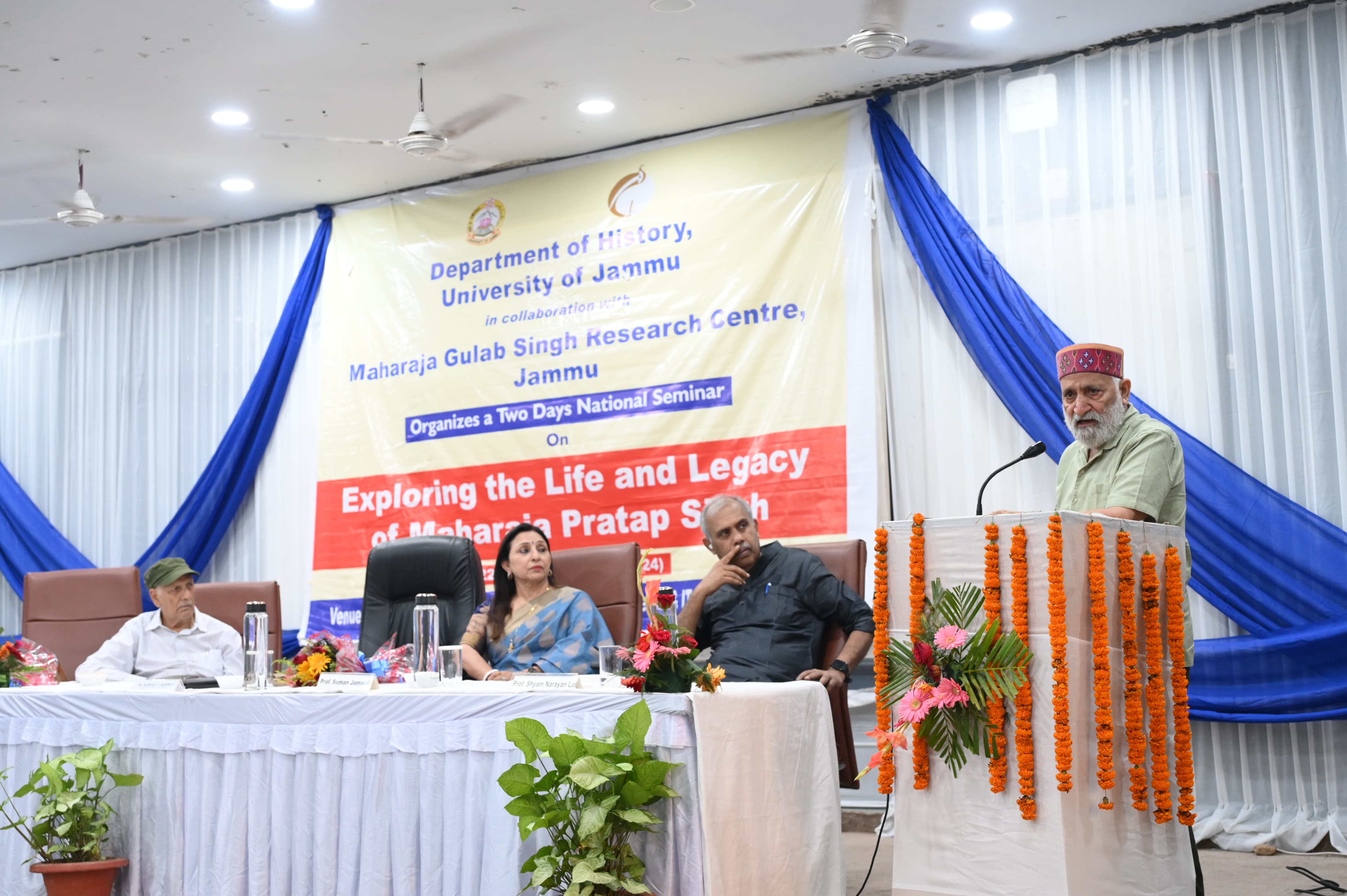About University

Cradled in the lap of mountains at the foothills of auspicious Trikuta, besides the river Tawi at an altitude of 1030 ft. is Jammu. This 'city of temples' has many places...
The second day of the national seminar on "Maharaja Pratap Singh: Life and Legacy" concluded today at the University of Jammu with a series of stimulating academic sessions, panel discussions, and a valedictory ceremony. The seminar, jointly organized by the Department of History, University of Jammu, and the Maharaja Gulab Singh Research Centre, witnessed a rich exchange of ideas and research on various aspects of Maharaja Pratap Singh’s contributions to Jammu and Kashmir.
The day began with the Fourth Academic Session, chaired by Prof. Daljeet Ahluwalia of Punjabi University, Patiala. Notable papers included Dr. Abdul Rashid Lone's presentation on "The Dawn of Archaeological Research in Kashmir" and Dr. Bheem Bakshi's exploration of Maharaja Pratap Singh’s reforms amidst colonial interventions.
of Punjabi University, Patiala. Notable papers included Dr. Abdul Rashid Lone's presentation on "The Dawn of Archaeological Research in Kashmir" and Dr. Bheem Bakshi's exploration of Maharaja Pratap Singh’s reforms amidst colonial interventions.
The Fifth Academic Session, chaired by Dr. Younus Rashid from the University of Kashmir, focused on broader historical perspectives, with Advocate Sumer Khajuria presenting a paper on Maharaja Pratap Singh’s role in shaping the national narrative. A joint paper by Dr. Thinlay Norboo and Dr. Gulam Murtaza highlighted the geopolitical legacy of the Dogra dynasty in Ladakh.
Parallel sessions were held at the Department of History, University of Jammu, chaired by Dr. Madhulika Singh and Dr. Siraz Ahmad, with scholars presenting papers on Maharaja Pratap Singh’s developmental reforms, agricultural conservation, and architectural heritage.
The Sixth Academic Session, chaired by Nidhi Bahuguna, showcased research on Maharaja Pratap Singh’s role in heritage conservation and economic strategies. The parallel session chaired by Dr. Siraz Ahmad included papers on military reforms and cultural heritage under the Maharaja’s rule, along with an insightful discussion on Queen Rani Charaki’s influence on J&K's religious landscape.
A major highlight of the seminar was the engaging panel discussion on the theme “A Direction to Future Research: Erstwhile State of Jammu and Kashmir,” which brought together distinguished scholars Padma Shri Prof. K.N. Pandita, Shri Ashutosh Bhatnagar, and Dr. Abdul Rashid Lone. The panelists collectively emphasized the importance of fostering collaborative research efforts to deepen historical understanding, with a particular focus on maintaining the authenticity of primary sources. They also proposed significant areas for future scholarly exploration, including debates on the potential reunification of Jammu, Kashmir, and Ladakh, the integration of regional histories, and the broader implications for Indian national narratives. Prof. Shyam Narayan Lal and Prof. Suman Jamwal contributed valuable insights during the discussion, further enriching the dialogue by highlighting the intersection of historical sources and contemporary regional studies, and calling for more interdisciplinary approaches to research. Their interventions brought attention to the necessity of addressing the marginalization of primary sources in existing research and underscored the need to bridge gaps in historical discourse.
The seminar concluded with the Valedictory Session, marked by the felicitation of the chief guests, Dr. Kuldeep C. Agnihotri, former Vice Chancellor of Central University Himachal Pradesh, and Padma Shri Prof. K.N. Pandita. Dr. Agnihotri, in his insightful valedictory address, highlighted the critical importance of maintaining historical continuity and integrating diverse historical narratives to achieve a comprehensive understanding of Jammu and Kashmir’s rich past. He underscored the value of comparative studies in the field of research, calling attention to the challenges and biases that often influence historical interpretation. Prof. Pandita, in his presidential remarks, lauded the seminar for its resounding success, commending the organizers and participants for their efforts in advancing scholarly discourse on Maharaja Pratap Singh and the broader history of Jammu and Kashmir. The session closed on a note of optimism, with a collective call for ongoing scholarly inquiry and collaboration.
Over the course of two days, more than 38 research papers were presented across eight academic sessions, contributing to a deeper understanding of Maharaja Pratap Singh’s life and legacy. The seminar concluded with a formal vote of thanks by Dr. Sushma Jamwal, Research Consultant, Maharaja Gulab Singh Research Centre.